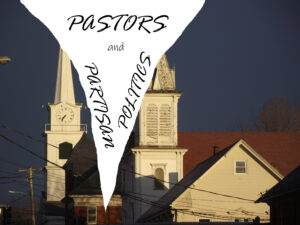
The presidential debate debacle graphically illustrates how divided we are as a nation. The rancor and animosity of Democrats and Republicans are rapidly reaching destructive levels in America. Partisan politics now infect our communities and even our churches. The Body of Christ is dividing over political allegiances, and some pastors are jumping into the fight on social media. Brothers, these things should not be! How should we respond as pastors?
Let us remember, brothers, to be salty.
Jesus said, “You are the salt of the earth; but if the salt has become tasteless, how can it be made to be salty again? It is no longer good for anything, except to be thrown out and trampled under foot by men” (Mt. 5:13). Our gospel witness can lose its potency by how we act and talk in a divided country. Once the church loses its saltiness, we become useless and discarded by our culture. We become just another political action committee (PAC) to be joined or rejected by the whims of our communities.
Jesus defines the saltiness we are to be. Jesus said these words to His followers in the Sermon on the Mount immediately following the Beatitudes (Mt. 5:1-12). The Beatitudes define our saltiness. They express the kingdom values that we are to exhibit in our relationships on earth. We are to be poor in spirit as recipients of the kingdom of heaven, not earth. Mourning and humility should mark our attitudes. We are to thirst after righteousness, be merciful and pure in heart. Called to be peacemakers, we are blessed by God when persecuted. We can rejoice when others attack us because our reward is in heaven. Saltiness exhibits these attitudes in our cultural debates. Our spirit should stand out amid the political rancor as people of a heavenly kingdom.
Who a person votes for is far less important than how we treat the person who votes. We show our saltiness by how we talk to – and about – a person on the other side of the political divide. Fighting for our political rights must never cause us to ignore Christ’s kingdom values. We diminish our gospel witness as we increase our political partisanship. Why should anyone listen to us talk about the love of Christ when we harshly condemn those who support ranked-choice voting or mail-in ballots? These matters have no eternal value whatsoever! We must care far less about who or what a person votes for or against and far more about the soul of the person who votes.
Let us remember, brothers, to live like foreigners.
We are citizens of heaven, not earth (Phil. 3:20). Peter writes: “Beloved, I urge you as aliens and strangers to abstain from fleshly lusts which wage war against the soul. Keep your behavior excellent among the Gentiles, so that in the thing in which they slander you as evildoers, they may because of your good deeds, as they observe them, glorify God in the day of visitation” (1 Peter 2:11-12). He writes this immediately following his great declaration that we are a “holy nation” and “a people for God’s own possession” (1 Peter 2:9). We are foreigners in a foreign land, looking for the city built by God (Heb. 11:9-10).
America – or any other country – is not our homeland. We owe our highest loyalty to our heavenly homeland. For this reason, Paul warns us not to unequally yoked together with unbelievers (2 Cor. 6:14). He is addressing the socio-political alliances that the Corinthian Christians were making to be successful in their earthly pursuits. Political parties are an excellent contemporary parallel to the partnerships that the Corinthians were making in their day. While it is not sin to partner with unbelievers in political activities, we must be careful not to be so wedded to a political party that we become bound to that party.
Yes. We are dual citizens. We are citizens of our country and have specific responsibilities as earthly citizens to serve, vote, and speak in our nation’s civil life. But the dual citizenship is not equal citizenship. Our earthly citizenship is the servant, not the master, of our heavenly citizenship. Just because presidential candidates fail to speak to each other with civility does not mean we have to follow their examples. The lack of civility is tearing our country apart. Political leaders increasingly treat the other party as enemies instead of as fellow citizens of this earthly nation. As citizens of heaven, we don’t have to succumb to this spirit of partisanship. We know that our higher loyalty is to our heavenly homeland. Everything we do and say should reflect our higher loyalty to all who are watching.
A BETTER WAY
There is a better way! We can treat those who oppose our political views with kindness and respect. Civility should mark our words. Humility should fill our spirits as we listen to one another. Grace should dominate our differences. Love should referee our disputes. We can engage with people respectfully and honestly, without rancor or animosity. The church of Jesus Christ should not be marred by political discord. God is neither Republican nor Democrat, and we can demonstrate that by how we treat one another in the church. Pastors need to lead their congregations by teaching and demonstrating these values in the church and the community.
Brothers, let us show the world a better way.


